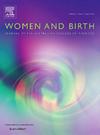Compassionate care or acting on routine - a video-ethnographic study of midwives’ and midwifery students' support during the second stage of labour
IF 4.4
2区 医学
Q1 NURSING
引用次数: 0
Abstract
Background
There is a lack of knowledge regarding how midwifery preceptors provide support during the second stage of labour while teaching. The aim of this study was to explore how midwives support women when they are precepting students, and to describe what types of support preceptors and midwifery students provide to women during the second stage.
Methods
A video-reflexive ethnography methodology utilising video recordings and interviews was conducted at two labour wards in Sweden. Four women were filmed and cared for by five preceptor-student pairs. The data was collected during 2019–2020 and was analysed inductively. A framework analysis approach was conducted using the Royal College of Midwives (RCM) guidance on support during childbirth, and the observed support dimensions found were quantified into minutes.
Findings
Two overarching themes were found: Support provided with compassion and Support provided in a routine manner. Of the RCM support dimensions Emotional support, Physical support, Information and advice were observed. The fourth support dimension Advocacy was lacking, and there were several instances of non-consented care.
Discussion
Support provided on routine and the absence of Advocacy, could be related to the fragmented care system, where midwives do not provide continuity of care to women. Despite midwives and midwifery students providing emotional and physical support, instances of disrespectful care were observed, which students also participated in.
Conclusion
There was evidence of disrespectful care that was normalised and accepted in the births that were filmed. This may further amplify students’ internalisation and reproduction of acts and behaviors that are disrespectful.
求助全文
约1分钟内获得全文
求助全文
来源期刊

Women and Birth
NURSING-OBSTETRICS & GYNECOLOGY
CiteScore
7.20
自引率
13.20%
发文量
371
审稿时长
27 days
期刊介绍:
Women and Birth is the official journal of the Australian College of Midwives (ACM). It is a midwifery journal that publishes on all matters that affect women and birth, from pre-conceptual counselling, through pregnancy, birth, and the first six weeks postnatal. All papers accepted will draw from and contribute to the relevant contemporary research, policy and/or theoretical literature. We seek research papers, quality assurances papers (with ethical approval) discussion papers, clinical practice papers, case studies and original literature reviews.
Our women-centred focus is inclusive of the family, fetus and newborn, both well and sick, and covers both healthy and complex pregnancies and births. The journal seeks papers that take a woman-centred focus on maternity services, epidemiology, primary health care, reproductive psycho/physiology, midwifery practice, theory, research, education, management and leadership. We also seek relevant papers on maternal mental health and neonatal well-being, natural and complementary therapies, local, national and international policy, management, politics, economics and societal and cultural issues as they affect childbearing women and their families. Topics may include, where appropriate, neonatal care, child and family health, women’s health, related to pregnancy, birth and the postpartum, including lactation. Interprofessional papers relevant to midwifery are welcome. Articles are double blind peer-reviewed, primarily by experts in the field of the submitted work.
 求助内容:
求助内容: 应助结果提醒方式:
应助结果提醒方式:


